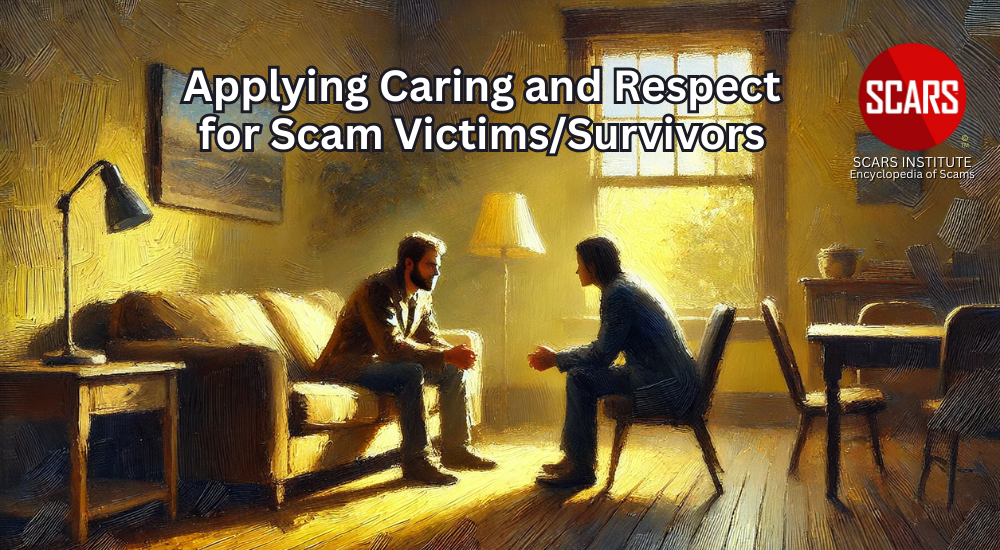
SCARS Institute’s Encyclopedia of Scams™ Published Continuously for 25 Years

How Police Decide What Is Worth Investigating?
The Challenge Police Face With Scams:
As any scam victim knows, the local police (or even national police) can be very reluctant to investigate these crimes. Some local police don’t even want to take a police report (though they will take “informational reports” if a victim insists).
Primarily, this is due to their ignorance about the best practices associated with these crimes and support for the victims.
There is a reason for this and it involves a Law Enforcement process known as “Solvability.”
When a police report is taken, several factors known as “Solvability Factors” go into deciding if a case will be investigated or even followed up on.
After all, why should the police waste precious resources on unsolvable crimes? Even if everything is known, some cases remain unsolvable by their very nature.
There are a number of reasons why local police may be reluctant to investigate online scams. One reason may be a lack of resources and training to properly investigate and prosecute cybercrimes. Additionally, online scams often cross jurisdictional boundaries, making it difficult for a single agency to investigate and prosecute the crime. Furthermore, many online scams originate from outside the country, making it even more difficult for local law enforcement to investigate and bring charges against the perpetrators. Additionally, some police officers may not understand the technical aspects of online scams and may not know how to properly gather evidence and interview victims.
However, we disagree. There is much that local police can do, including recover the victim’s money.
But it is important to understand their decision-making to try to find reasons why they should help.
Solvability Factors
What are Solvability Factors that the police use to decide to green-light police investigations into these crimes?
Solvability factors are criteria that law enforcement agencies use to evaluate and prioritize criminal cases, and are used to determine whether a crime will be investigated and/or solved. Some of the solvability factors that police use to decide whether to investigate a crime include:
These are the Solvability Factors that determine Police Investigations:
- Quality of evidence: Police will prioritize cases where there is a large amount of evidence that is likely to lead to a conviction. Most scam victims come in very disorganized and it makes it hard for the police to understand the crime.
- Is a suspect known: In the case of online scams – do you have a REAL identity or just fake names. If a suspect has been identified, the police will be more likely to investigate the case.
- A reliable witness with factual information regarding the crime: In the case of scams that is the victim – though sadly not all victims are reliable.
- Witness cooperation: Police are more likely to investigate cases where witnesses are willing to come forward and provide statements or testify in court.
- Is there a description of the suspect that is adequate to separate the suspect from others?
This is where hard data comes in – real photos or videos that are truly of the scammer. Rarely do victims have hard-data. - Is there a possible location for the suspect?
Most victims have (at best) a money transfer address, not an actual location for the real scammer. - Can the suspect be identified using photo images, line-up, etc.?
This assumes that you have a real photo of the scammer – unless you have also seen a real-time video with audio you just don’t know. Scammers use stolen photos like toilet paper, and nothing they say can be reliably believed. - Has the victim or witness seen the suspect before or since?
In the case of scams, the answer is generally NO since scams are often conducted by gangs, organizations, or teams. You could see a hundred fake identities using the same stolen photo and there is no reason to believe it is even the same group of scammers. - A vehicle with a known license plate, make, model, color, identifiers, etc.: Even if you see a photo of a vehicle on a social media profile how do you know if belongs to the scammer? Remember stolen photos?
- Is stolen property traceable through a known serial number, owner-applied marks, damage, or unique description: This assumes the property is where the police can get to it – this applies mostly in the case of Money Mules. However, now with cryptocurrency scams, the money is traceable and recoverable.
- Community impact: Crimes that have a significant impact on the community, such as violent crimes or crimes that are affecting a large number of people, will be given a higher priority. With online and phone scams it impacts virtually everyone in their community, they just do not understand that.
- Is there a distinct pattern or method (“M.O.”) linking the suspect to multiple crimes?
Here the problem is that there are just too many criminals doing exactly the same thing. It is institutional. It is international. It is global. There are over 100,000 professional scammers working at any time now. - Is there usable physical evidence such as DNA, fingerprints, surveillance video/photos, etc.?
This is always no. Not even the Bank Transfer, MoneyGram, or Western Union information is reliable since the money can be picked up by anyone, including by fake names. Even phone numbers are not reliable in an age of forwarding internet phone numbers, and burner phones. Forget about emails, scammer burn through millions of them. - Was there a limited opportunity for the crime that would eliminate other potential suspects?
Again, there are 100,000 other scammers out there! - Is the crime or the suspect within their jurisdiction?
These are almost never within the Police’s jurisdiction, and almost never even in that country! - Available resources: Police departments have limited resources, so they will prioritize cases based on the availability of officers and other resources.
- Probability of success: If the police believe that they have a good chance of solving a case, they will be more likely to investigate it.
These Solvability Factors allow Police Departments around the world to use their resources efficiently.
When you look logically at the problem from the Police’s point of view, almost no online crime is solvable at the local police level, and most do not even at the national level.
Sadly, this is the reason why you receive the response you get when you ask for local police help.
It Is Still Vitally Important That You Report These Crimes To Your Local Police
This enables several beneficial processes and results:
- You obtain a police report which can be used for insurance claims (if applicable), and any possible tax deductions (where applicable).
- It enables the possibility of recovering your money.
- It allows the locality to fully understand how many of these crimes are happening, and they get reported up through to the national level.
- This helps pressure politicians to enact new laws and treaties to better address these crimes.
- Local communities frequently have crime victim assistance and support services that you can take advantage of after you file a report.
It also legitimizes your experience as a crime in the mind of your friends and family. This will help change the way people view you and will aid in the support structure that will help you to recover.
At this stage, we are in a transition period where there used to be little that our police can do, and you can see why they limit their resources and attention to these crimes. But the more they are reported, and the more experience everyone has, the more it will be addressed. Today, there is much that the local police can do – see here.
So always report these crimes to your local police.
Where To Report?
If you lost money: the way to report this is first with your local police – they are your first responders, then always report all scams to the FTC at https://reportfraud.ftc.gov/#/?orgcode=SCARS and to SCARS at www.Anyscam.com – optionally, you can also report to the FBI at www.IC3.gov or 1-800-CALL-FBI. In addition, you can call the Homeland Security Investigations (HIS) Tip Line at 1-866-347-2423
You can find more places to report here.
If you did not lose money just report the fake profiles to Facebook or Instagram, etc.
Do The Right Thing! Report The Crime!
Be Safe Online!
-/ 30 /-
What do you think about this?
Please share your thoughts in a comment below!
Table of Contents
- How Do They Decide What Is Worth It?
- How Police Decide What Is Worth Investigating?
- The Challenge Police Face With Scams:
- There is a reason for this and it involves a Law Enforcement process known as “Solvability.”
- Solvability Factors
- It Is Still Vitally Important That You Report These Crimes To Your Local Police
- Where To Report?
- Do The Right Thing! Report The Crime!
- Be Safe Online!
LEAVE A COMMENT?
Thank you for your comment. You may receive an email to follow up. We never share your data with marketers.
Recent Comments
On Other Articles
- on Love Bombing And How Romance Scam Victims Are Forced To Feel: “I was love bombed to the point that I would do just about anything for the scammer(s). I was told…” Feb 11, 14:24
- on Dani Daniels (Kira Lee Orsag): Another Scammer’s Favorite: “You provide a valuable service! I wish more people knew about it!” Feb 10, 15:05
- on Danielle Delaunay/Danielle Genevieve – Stolen Identity/Stolen Photos – Impersonation Victim UPDATED 2024: “We highly recommend that you simply turn away form the scam and scammers, and focus on the development of a…” Feb 4, 19:47
- on The Art Of Deception: The Fundamental Principals Of Successful Deceptions – 2024: “I experienced many of the deceptive tactics that romance scammers use. I was told various stories of hardship and why…” Feb 4, 15:27
- on Danielle Delaunay/Danielle Genevieve – Stolen Identity/Stolen Photos – Impersonation Victim UPDATED 2024: “Yes, I’m in that exact situation also. “Danielle” has seriously scammed me for 3 years now. “She” (he) doesn’t know…” Feb 4, 14:58
- on An Essay on Justice and Money Recovery – 2026: “you are so right I accidentally clicked on online justice I signed an agreement for 12k upfront but cd only…” Feb 3, 08:16
- on The SCARS Institute Top 50 Celebrity Impersonation Scams – 2025: “Quora has had visits from scammers pretending to be Keanu Reeves and Paul McCartney in 2025 and 2026.” Jan 27, 17:45
- on Scam Victims Should Limit Their Exposure To Scam News & Scammer Photos: “I used to look at scammers photos all the time; however, I don’t feel the need to do it anymore.…” Jan 26, 23:19
- on After A Scam, No One Can Tell You How You Will React: “This article was very informative, my scams happened 5 years ago; however, l do remember several of those emotions and/or…” Jan 23, 17:17
- on Situational Awareness and How Trauma Makes Scam Victims Less Safe – 2024: “I need to be more observant and I am practicing situational awareness. I’m saving this article to remind me of…” Jan 21, 22:55
ARTICLE META
Important Information for New Scam Victims
- Please visit www.ScamVictimsSupport.org – a SCARS Website for New Scam Victims & Sextortion Victims
- Enroll in FREE SCARS Scam Survivor’s School now at www.SCARSeducation.org
- Please visit www.ScamPsychology.org – to more fully understand the psychological concepts involved in scams and scam victim recovery
If you are looking for local trauma counselors please visit counseling.AgainstScams.org or join SCARS for our counseling/therapy benefit: membership.AgainstScams.org
If you need to speak with someone now, you can dial 988 or find phone numbers for crisis hotlines all around the world here: www.opencounseling.com/suicide-hotlines
A Note About Labeling!
We often use the term ‘scam victim’ in our articles, but this is a convenience to help those searching for information in search engines like Google. It is just a convenience and has no deeper meaning. If you have come through such an experience, YOU are a Survivor! It was not your fault. You are not alone! Axios!
A Question of Trust
At the SCARS Institute, we invite you to do your own research on the topics we speak about and publish, Our team investigates the subject being discussed, especially when it comes to understanding the scam victims-survivors experience. You can do Google searches but in many cases, you will have to wade through scientific papers and studies. However, remember that biases and perspectives matter and influence the outcome. Regardless, we encourage you to explore these topics as thoroughly as you can for your own awareness.
Statement About Victim Blaming
SCARS Institute articles examine different aspects of the scam victim experience, as well as those who may have been secondary victims. This work focuses on understanding victimization through the science of victimology, including common psychological and behavioral responses. The purpose is to help victims and survivors understand why these crimes occurred, reduce shame and self-blame, strengthen recovery programs and victim opportunities, and lower the risk of future victimization.
At times, these discussions may sound uncomfortable, overwhelming, or may be mistaken for blame. They are not. Scam victims are never blamed. Our goal is to explain the mechanisms of deception and the human responses that scammers exploit, and the processes that occur after the scam ends, so victims can better understand what happened to them and why it felt convincing at the time, and what the path looks like going forward.
Articles that address the psychology, neurology, physiology, and other characteristics of scams and the victim experience recognize that all people share cognitive and emotional traits that can be manipulated under the right conditions. These characteristics are not flaws. They are normal human functions that criminals deliberately exploit. Victims typically have little awareness of these mechanisms while a scam is unfolding and a very limited ability to control them. Awareness often comes only after the harm has occurred.
By explaining these processes, these articles help victims make sense of their experiences, understand common post-scam reactions, and identify ways to protect themselves moving forward. This knowledge supports recovery by replacing confusion and self-blame with clarity, context, and self-compassion.
Additional educational material on these topics is available at ScamPsychology.org – ScamsNOW.com and other SCARS Institute websites.
Psychology Disclaimer:
All articles about psychology and the human brain on this website are for information & education only
The information provided in this article is intended for educational and self-help purposes only and should not be construed as a substitute for professional therapy or counseling.
While any self-help techniques outlined herein may be beneficial for scam victims seeking to recover from their experience and move towards recovery, it is important to consult with a qualified mental health professional before initiating any course of action. Each individual’s experience and needs are unique, and what works for one person may not be suitable for another.
Additionally, any approach may not be appropriate for individuals with certain pre-existing mental health conditions or trauma histories. It is advisable to seek guidance from a licensed therapist or counselor who can provide personalized support, guidance, and treatment tailored to your specific needs.
If you are experiencing significant distress or emotional difficulties related to a scam or other traumatic event, please consult your doctor or mental health provider for appropriate care and support.
Also read our SCARS Institute Statement about Professional Care for Scam Victims – click here to go to our ScamsNOW.com website.
















Again, this is all very good information, solidifying the fact that there is little I can do other than report my crime. I have faced much negative feedback from my crime. My spirits are very low and I feel that I’m nothing more than a number. I have no hopes of recovering any money due to the fact that my local law enforcement unprofessionally handled my report – taking almost 4 months to actually give me a number. I truly hope we see a day that reporting increases, that victims feel secure in making a report and that arrests are made and the criminals are convicted.
I wish cyber internet fraud was easier to solve. In my case it has taken me months to discover how my scammer misdirected my information and hijacked my account.
Hi – Will Malaysia police be able to take action against a Romance scammer based on tip off?? or news media etc.,?
File a proper report on our site or on http://www.Anyscam.com
Please stop sending messages to me…thank you
Use the unsubscribe option in the email – at least make an effort.
Have 2 people online with the same name stories are very close both need money